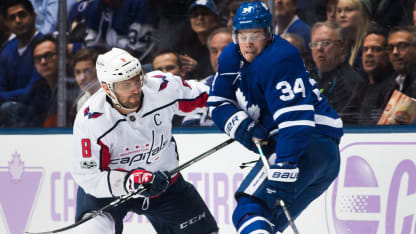And the 20-year-old Matthews, in his second NHL season, could be following the career trajectory of Ovechkin, who is 32 and in his 13th NHL season.
Each has been among the League's goal leaders from the beginning of his NHL career, but Ovechkin, the No. 1 pick in the 2004 NHL Draft, got off to a stronger start. In his first 118 League games, he had 155 points (77 goals, 78 assists). Matthews, the No. 1 pick in the 2016 NHL Draft, has 102 points (59 goals, 43 assists) in his first 118 NHL games.
RELATED: [Capitals unveil Stadium Series jersey | Stadium Series coverage]
Since his League debut at age 19, a four-goal performance against the Ottawa Senators on Oct. 12, 2016, Matthews was tied for fourth in goals, eight behind Nikita Kucherov of the Tampa Bay Lightning, entering Wednesday. He was tied for No. 125 in assists and was No. 28 in points. After his first 118 games, Ovechkin, who entered the NHL at age 20 in 2005-06, ranked first in goals, five ahead of Ilya Kovalchuk, was tied for No. 17 in assists and was fourth in points.
Ovechkin's 18-goal lead on Matthews can be explained, in part, by power-play usage. Matthews has averaged 2:23 per game with the man-advantage, which is No. 164 on the list of average power-play time during that span. During the same window at the start of his NHL career, Ovechkin averaged 6:24 on the power play, which is No. 10 on the list and 4:01 more per game. Ovechkin outscored Matthews 31-10 on the power play in the 118-game span to start each player's career.


















